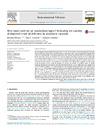Please use this identifier to cite or link to this item:
https://accedacris.ulpgc.es/jspui/handle/10553/75413
| Title: | How much crude oil can zooplankton ingest? Estimating the quantity of dispersed crude oil defecated by planktonic copepods | Authors: | Almeda, Rodrigo Connelly T.L Buskey E. |
UNESCO Clasification: | 251001 Oceanografía biológica | Keywords: | Crude oil Zooplankton Ingestion Fecal pellets Oil spills |
Issue Date: | 2016 | Journal: | Environmental Pollution | Abstract: | We investigated and quantified defecation rates of crude oil by 3 species of marine planktonic copepods(Temora turbinata,Acartia tonsa, andParvocalanus crassirostris) and a natural copepod assemblage afterexposure to mechanically or chemically dispersed crude oil. Between 88 and 100% of the analyzed fecalpellets from three species of copepods and a natural copepod assemblage exposed for 48 h to physicallyor chemically dispersed light crude oil contained crude oil droplets. Crude oil droplets inside fecal pelletswere smaller (median diameter: 2.4e3.5mm) than droplets in the physically and chemically dispersed oilemulsions (median diameter: 6.6 and 8.0mm, respectively). This suggests that copepods can reject largecrude oil droplets or that crude oil droplets are broken into smaller oil droplets before or duringingestion. Depending on the species and experimental treatments, crude oil defecation rates ranged from5.3 to 245 ng-oil copepod 1d 1, which represent a mean weight-specific defecation rate of 0.026mg-oilmg-Ccopepod1d 1. Considering a dispersed crude oil concentration commonly found in the water columnafter oil spills (1mlL 1) and copepod abundances in high productive coastal areas, copepods maydefecate ~1.3e2.6 mg-oil m 3d 1, which would represent ~0.15%e0.30% of the total dispersed oil perday. Our results indicate that ingestion and subsequent defecation of crude oil by planktonic copepodshas a small influence on the overall mass of oil spills in the short term, but may be quantitativelyimportant in theflux of oil from surface water to sediments and in the transfer of low-solubility, toxicpetroleum hydrocarbons into food webs after crude oil spills in the sea | URI: | https://accedacris.ulpgc.es/handle/10553/75413 | ISSN: | 0269-7491 | DOI: | 10.1016/j.envpol.2015.10.041 | Source: | Environmental Pollution [ISSN 0269-7491], v. 208, part B, January 2016, Pages 645-654 (January 2016) |
| Appears in Collections: | Artículos |
Items in accedaCRIS are protected by copyright, with all rights reserved, unless otherwise indicated.
